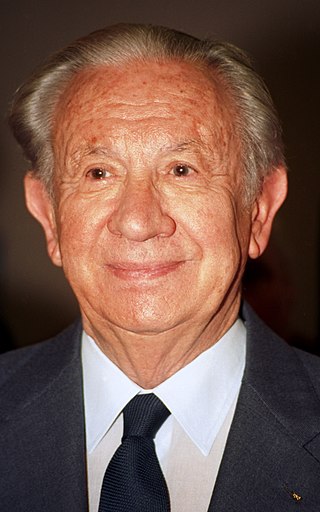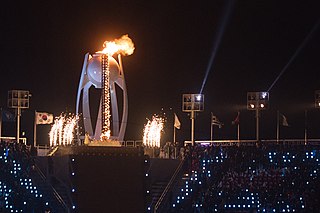
Juan Antonio Samaranch y Torelló, 1st Marquess of Samaranch was a Spanish sports administrator under the Franco regime (1973–1977) who served as the seventh President of the International Olympic Committee (IOC) from 1980 to 2001.

The president of the Republic of Korea, also known as the president of South Korea (Korean: 대통령), is the head of state and head of government of the Republic of Korea. The president leads the State Council, and is the chief of the executive branch of the national government as well as the commander-in-chief of the Republic of Korea Armed Forces.

Roh Tae-woo was a South Korean politician and army general who served as the 6th president of South Korea from 1988 to 1993. He was the first democratically elected president of South Korea.
Nordpolitik was the signature foreign policy of South Korean president Roh Tae-woo. The policy guided South Korean efforts to reach out to the traditional allies of North Korea, with the goal of normalized relations with the closest allies to North Korea, China and the Soviet Union. By adopting Nordpolitik, South Korea abolished the doctrine of the enemy of my enemy is my friend and understood that the indirect approach was a more plausible way to engage with North Korea. The policy improved the South's economy while leaving the North more isolated and was a dramatic and historic turning point of South Korea's diplomatic goals.
The Closing Ceremony of the 2006 Winter Olympics took place on 26 February 2006 beginning at 20:00 CET (UTC+1) at the Stadio Olimpico in Turin, Italy.

Presidential elections were held in South Korea on 16 December 1987. They marked the establishment of the Sixth Republic, as well as the end of the authoritarian rule that had prevailed in the country for all but one year since its founding in 1948. They were the first direct presidential elections since 1971. For the previous 15 years, presidents had been indirectly elected by the National Conference for Unification, an electoral college dominated by the governing party.

The Olympic Games ceremonies of the Ancient Olympic Games were an integral part of these Games; the modern Olympic games have opening, closing, and medal ceremonies. Some of the elements of the modern ceremonies date back to the Ancient Games from which the Modern Olympics draw their ancestry. An example of this is the prominence of Greece in both the opening and closing ceremonies. During the 2004 Games, the medal winners received a crown of olive branches, which was a direct reference to the Ancient Games, in which the victor's prize was an olive wreath. The various elements of the ceremonies are mandated by the Olympic Charter, and cannot be changed by the host nation. This requirement of seeking the approval of the International Olympic Committee (IOC) includes the artistic portion of opening and closing ceremonies.

The closing ceremony of the 2004 Summer Olympics was held on 29 August 2004 21:15 EEST (UTC+3) at the Olympic Stadium, in Marousi, Greece, a suburb of Athens.
The opening ceremony of the 1996 Summer Olympics took place in the evening on Friday, July 19 at the Centennial Olympic Stadium, Atlanta, United States. As mandated by the Olympic Charter, the proceedings combined the formal and ceremonial opening of this international sporting event, including welcoming speeches, hoisting of the flags and the parade of athletes, with an artistic spectacle to showcase the host nation's culture and history. The Games were officially opened by President of the United States of America Bill Clinton.
Events from the year 1988 in South Korea.

Park Seh-jik was a South Korean politician, bureaucrat and army general. He held many powerful positions throughout his lifetime, such as the Mayor of Seoul and the Director of Agency for National Security Planning (ANSP), a preceding agency of the National Intelligence Service (NIS). He was President of the Seoul Organizing Committee for the 1986 Asian Games and 1988 Summer Olympics in Seoul.

The opening ceremony of the 2018 Winter Olympics was held at the Pyeongchang Olympic Stadium in Pyeongchang, South Korea on 9 February 2018. It began at 20:00 KST and finished at approximately 22:20 KST. The Games were officially opened by President of the Republic of Korea Moon Jae-in.

The closing ceremony of the 2018 Winter Olympics was held on 25 February 2018 from 20:00 to 22:05 KST (UTC+9). The ceremony took place at Pyeongchang Olympic Stadium in Pyeongchang County, South Korea.
The Seoul Olympic Organizing Committee for the Games of the XXIV Olympiad, or SLOOC, also known as the Seoul Olympic Organizing Committee, was an informal name for the Seoul Olympic Organizing Committee for the Games of the XXIV Olympiad. The President of SLOOC was Park Seh-jik.

The closing ceremony of the 1988 Summer Olympics took place at Seoul Olympic Stadium in Seoul, South Korea, on 2 October 1988 at 19:00 -20:45 KDT (UTC+10).
The closing ceremony of the 1992 Summer Olympics took place at Estadi Olímpic de Montjuïc in Barcelona, Spain, on 9 August 1992.
The closing ceremony of the 1984 Summer Olympics took place at the Los Angeles Memorial Coliseum in Los Angeles, California on Sunday, August 12, 1984, at 20:00 PDT.
The closing ceremony of the 1998 Winter Olympics took place at Nagano Olympic Stadium, Nagano, Japan, on 22 February 1998. It began at 18:00 JST and finished at approximately 19:41 JST. As mandated by the Olympic Charter, the proceedings combines the formal and ceremonial closing of this international sporting event, including farewell speeches and closing of the Games by IOC President Juan Antonio Samaranch. The Olympic flame has been extinguished.

Kim Ok-suk is the widow of South Korean President Roh Tae-woo. She was the first lady when Roh Tae-woo was in office, from 1988 to 1993.
Cho Soon was a South Korean politician who was the first publicly elected mayor of Seoul, serving from 1995 to 1997. Previously, he was the Deputy Prime Minister of South Korea from 1988 to 1990 and the Chief of the Bank of Korea.










